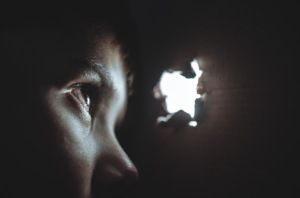News
Lenient law concerning sex with young teens finally overhauled in Denmark
This article is more than 3 years old.
Sexual intercourse with a minor aged 12-14 will now be regarded as rape

A chink of light for children left in the dark by the old law (photo: Pixabay)
It’s a head-scratcher, alright. British readers might even go as far as asking whether Red Barnet, the Danish branch of Save the Children, is named after the marks left behind.
Until yesterday, sexual intercourse with a child aged 12, 13 or 14 was only classified as sex with a minor, carrying a maximum sentence of eight years in prison.
But in many cases, adult perpetrators have got off with a lenient sentence if they were able to demonstrate they had a meaningful relationship with the child.
Law was too lenient
Two years ago, for example, a 32-year-old male schoolteacher was sentenced to just two years for having a sexual relationship with a 13-year-old girl.
The teacher was acquitted of rape on the grounds that the girl voluntarily acceded. Instead, he was convicted of assaulting a minor.
Sometimes they get off scot-free completely. “We have seen too many cases where adult perpetrators are acquitted of having abused children on the grounds that the child has participated voluntarily in a ‘boyfriend-like relationship’,” Red Barnet psychologist Ane Lemche told DR.
Now treated as rape
But from today, after unanimous backing from Parliament, sexual intercourse with a child under the age of 15 will be classified as rape – the same as sex with anyone under the age of 12.
The maximum sentence for such an offence is 12 years in prison and, importantly, it makes it absolutely illegal for a child aged 12-14 to consent to having sex with an adult.
However, should the perpetrator be under the age of 22, then the law is more lenient.
Psychologist: children were blaming themselves
According to Lemche, the new law is long overdue.
“Children cannot give consent to sex with an adult, because they cannot see what it means to be sexually active with an adult, and it is extremely difficult for a child to say no,” she said.
“It is completely unreasonable to place that responsibility on a child when it comes to a sexual assault. The change in the criminal law makes it clear to the child that it is not the child’s fault, but the adult who has done something wrong.”
Other laws passed
The new bill passed by Parliament has also introduced a number of other laws.
Sex dolls of children have been banned, and more powers have been granted to the police to conduct secret searches in cases of child pornography.
Adults will face stiffer sentences for abusing children – an increase of 50 percent – and the authorities now have the power to confiscate the passport of anyone convicted of sexually abusing children.










































